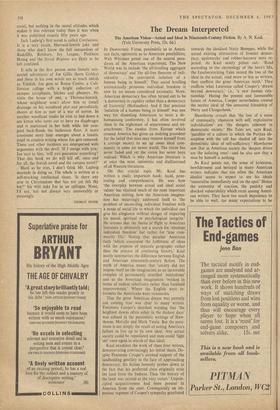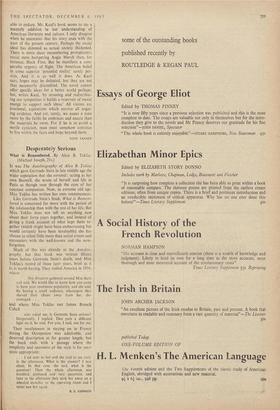The Dream Interpreted
Nineteenth-Century Fiction. By A. N. Kaul.
IN Democratic Vistas, pessimistic as to Ameri- can facts, optimistic as to American possibilities, Walt Whitman posed one of the central para- doxes of the American experiment, The New World was to include 'the all-levelling aggregate of democracy' and 'the all-free theorem of indi- viduality . . . the centripetal isolation of a human being in himself.' That social levelling automatically promotes individual freedom is now by no means considered axiomatic. More, American democracy has often turned •out to be
'a democracy in cupidity rather than a democracy of fraternity' (Hofstadter). And if that precious 'isolation of a human being in himself' was one way for dissenting Americans to resist a de- humanising conformity, it has often involved them in the nightmare of separateness and un- attachment. The exodus from Europe which created America has given an undying precedent for the belief that man may remove himself from a corrupt society to set up some ideal com- munity in some yet newer world. The vision has never faded and yet the vision has never been realised. Which is why American literature is at once the most optimistic and disillusioned of all Western literatures.
On this crucial topic Mr. Kaul has written a really important book; lucid, pene- trating and comprehensive. He sees how 'the interplay between actual and ideal social values' has vitalised much of the most important American writing, how the American imagina- tion has recurringly addressed itself to 'the problem of reconciling individual freedom with a mode of social life to which the individual can
give his allegiance without danger of impairing his moral, spiritual or psychological integrity.'
He stresses that the theme of flight in American literature is ultimately not a search for 'absolute individual freedom' but rather for 'true com- munity life.' Noting that peculiar American faith 'which associated the fulfilment of ideas with the promise of separate geography rather than the process of continuing history,' Kaul neatly summarises the difference between English and American nineteenth-century fiction. The myth of America meant that 'society did not impose itself on the imagination as an inexorable complex of permanently stratified institutions'
and so the American imagination 'worked in terms of radical substitutes rather than localised improvements.' Where the English were re- formers the Americans were visionaries.
That the great American dream was patently not coming true was clear to many writers.
Fenimore Cooper's mordant warning that 'the brightest dawns often usher in the darkest days' was echoed in the pessimistic writings of Haw- thorne, Melville and Mark Twain. But the pessi- mism is not simply the result of noting America's failure to live up to its own ideal. Any actual society could be repudiated and man could 'light out' once again in search of that ideal.
Kaul examines the work of these four writers, . demonstrating convincingly his initial thesis. De- spite Fenimore Cooper's avowed, support of the landholding gentility in the face of approaching democracy, his fiction honestly probes down to the fact that his preferred class originally stole the land from the Indians. Thus 'the history of the land was tainted at the very outset.' Unprin- cipled acquisitiveness had been present in America from the start. Consequently an im- portant segment of Cooper's sympathy gravitated
towards the idealised Natty Bumppo, while the actual existing alternatives of frontier democ- racy, squirearchy. and robber-baronry were re- jected. As Kaul neatly points out: 'Read according to the chronology of the hero's life, the Leatherstocking Tales record the loss of the ideal in the actual; read more or less as written, they reaffirm the great American myth.' They reaffirm what Lawrence called Cooper's 'dream beyond democracy,' i.e., 'a new human rela- tionship.' Hating the present and foreseeable future of America, Cooper nevertheless created the mythic ideal of 'the immortal friendship of Natty and Chingachook.'
Hawthorne reveals that 'the loss of a sense of community, obsession with self, exploitative individualism' are 'the dangers inherent in democratic society.' His Tales are, says Kaul, 'parables of a culture in which the Puritan ab- sorption with the self has shaded off into the democratic ideal of self-sufficiency.' Hawthorne saw that in American society the 'deepest drives are the isolating ones'—and he also saw that a man by himself is nothing.
As Kaul points out, the sense of bitterness, bewilderment and betrayal in many American writers indicates that too often the American idealist seems to expect to see his ideals 'materialise immediately and on the spot.' Hence the extremity of reaction, the panicky and shocked vulnerability which recur among Ameri- can writers. They have too much impatience to be able to wait, too many expectations to be
able to endure. Mr. Kaul's book seems to me a masterly addition to our understanding of American literature and culture. I only disagree when he maintains that his story ends with the start of the present century. Perhaps the social ideal has dimmed as actual society thickened. There is more sheer encumbering protoplasmic social mess hampering Augie March than, for instance, Huck Finn. But he manifests a com- parable urgency of flight. The American belief in some superior 'potential reality' surely per- sists. And it is as well it does. As Kaul says, hopes may be defeated, but they are not thus necessarily discredited. The novel cannot offer specific ideas for a better world perhaps, but, writes Kaul, `by arousing and redistribut- ing our sympathies it builds a reservoir of moral energy to support such ideas.' All visions are irrational, aspirations which survive all negat- ing evidence. And yet, surely, we assess a man more by the faiths he embraces and enacts than the materials he owns. For if he is to avoid a sterile cynicism, man must somehow continue to live within the facts and hope beyond them.
TONY TANNER







































 Previous page
Previous page